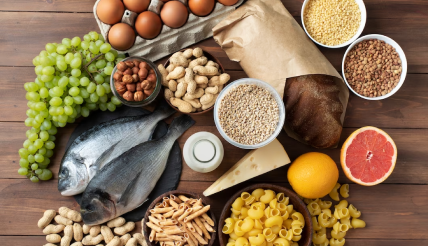You may also like…
Fiber for Weight Loss: The Surprising Secret to Shedding Pounds
In a world where obesity and its associated health concerns are on the rise, finding effective and sustainable ways to manage our weight is of paramount importance. One often-overlooked weapon in the battle against the bulge is dietary fiber.
1. Fermentation by Gut bacteria
Fiber is fermented by gut bacteria to produce certain compounds that play a beneficial role in contributing to overall health. Gut microorganisms (bacteria, archaea, viruses, and fungi) produce short chain fatty acids, which further serve as excellent health promoters in the body.
Amongst many of their health advantages, the short chain fatty acids help maintain the lining of the gut from inside, activating satiety centers in the brain and maintaining overall health. Activating gut bacteria also promotes a diverse array of gut bacteria which promotes better health. Additionally, fermentation in the colon may trigger a sense of fullness, leading to curbed appetite.
2. Decreased energy intake
Excessive energy intake is a key factor contributing to obesity and related health issues, posing a significant nutritional challenge. Dietary fiber, unlike digestible carbohydrates like starch and sugars, has a low energy density and can help curb appetite. Fiber types range from those with high energy content, found in fruits, legumes, whole grains, nuts and vegetables to some with negative energy content, like certain cereals, sugar and processed foods (meat, juices, starchy grains). Some fibers promote satiety by becoming viscous or forming larger particles, aiding in digestion and prolonging stomach retention.
3. Viscous fibers
Viscous fibers are special fibers which swell to become a gel-like substance in water based solutions. This gel formation is what distinguishes them from insoluble fibers, which do not dissolve in water. They improve digestive health by slowing down digestive movements and therefore help patients with diarrhea and irritable bowel syndrome.
In addition they prevent rapid spikes of blood sugar through slowing its absorption down. It has also been suggested that viscous fibers reduce cholesterol (especially LDLs : the bad kind) by preventing their absorption and accelerating their excretion.
4. The weight loss with fiber myth
In situations where energy intake is not restricted ("ad libitum"), consuming an additional 14 g/day of fiber for more than 2 days is associated with a 10% decrease in energy intake and an average body weight loss of 1.9 kg over 3.8 months. Obese individuals may experience even greater benefits from increased fiber intake, with a more pronounced reduction in energy intake (82%) and greater body weight loss (2.4 kg) compared to lean individuals (94% and 0.8 kg, respectively).
5. Fiber prevents obesity
Epidemiologic support that dietary fiber intake prevents obesity is strong. Fiber intake is inversely associated with body weight and body fat. In addition, fiber intake is inversely associated with body mass index at all levels of fat intake after adjusting for variable factors.
Results from intervention studies are more mixed, although the addition of dietary fiber generally decreases food intake and, hence, body weight. Many mechanisms have been suggested for how dietary fiber aids in weight management, including promoting satiation (fullness), decreasing absorption of macronutrients, and altering secretion of gut hormones.
6. Fiber prevents many diseases
Dietary fiber intake provides many health benefits. However, average fiber intakes for US children and adults are less than half of the recommended levels. Individuals with high intakes of dietary fiber appear to be at significantly lower risk for developing coronary heart disease, stroke, hypertension, diabetes, obesity, and certain gastrointestinal diseases.
Increasing fiber intake lowers blood pressure and serum cholesterol levels. Increased intake of soluble fiber improves glycemia and insulin sensitivity in non-diabetic and diabetic individuals.
Fiber supplementation in obese individuals significantly enhances weight loss. Increased fiber intake benefits a number of gastrointestinal disorders including the following: gastroesophageal reflux disease, duodenal ulcer, diverticulitis, constipation, and hemorrhoids. Prebiotic fibers appear to enhance immune function. Dietary fiber intake provides similar benefits for children as for adults.
Powered by Froala Editor






